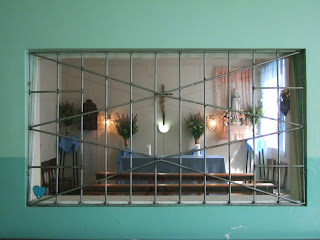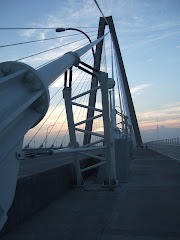We followed a group from the mission through the market one day. We were all clad in medical scrubs, a blur of flat greens and blues sidestepping worn tables covered in fresh fruits. Pyramids of apples and mandarin oranges. Giant grapes, like clusters of purple golf balls. And countless, exotic varieties I could not identify.
I passed a mustachioed fishmonger whose smile stopped me. He asked in Spanish if I spoke Spanish. Sorry. No hablo Espanol.
In our short, hand-gesturing, patchwork conversation, I told him I was from the United States. A-la-ba-ma. Because of what I wore, he asked if I was a doctor. Despite the fact that I have no medical training, I decided it would be much easier just to tell him yes.
He nodded his head, and in English said, “Thank you.”
I had the opportunity to share this vignette with the medical team our last night together at a banquet. I told them that almost every one of them had spoken of their amazement at how appreciative their patients and their patients’ families had been. But this man, who did not sit in the hall outside the operating room during the week, who did not pace with his pregnant wife, offered appreciation, not for what they had done for his family, but for his people.
I told them that I didn’t pick up one scalpel this week. Didn’t start one I.V. I didn’t even give away one stuffed animal. But I had watched them and I had listened. My ultimate job was to tell the story of this mission to a great audience, most of whom have only heard of this beautiful country. I was a messenger.
My first message, though, was for the team.
I told them Ecuador said thank you.
Monday, February 18, 2008
Mother and Child

So many from the medical team frequently made comments on how stoic the Ecuadorian people they encountered were. In the face of sickness the mothers and fathers rarely changed their expressions. These were a strong people, toughened by life. I watched this woman bring her son into the pre-op area and followed them through to the recovery room. She only left his side when the surgeons kept her out of the operating room. I witnessed an undying devotion in her and in countless other parents in our time there.
Valentine's Dance
Rooftop Laundry
La Escuela Rotario de Quindialo

One of the most moving excursions we made was on Valentine’s with a pediatric team up to a school in Quindialo, a little village about a 40 minute van ride up a mountain outside of Ambato. The children were buzzing around us as soon as we stepped onto the dirt courtyard. It was a completely different energy from what we had felt in the hospitals, because these kids (around 25 in all) were mostly healthy and full of vitality. The team offered simple check-ups and distributed bags of sunscreen, kiddie vitamins, and toys.
The headmaster gathered the children, and they sang group songs for us. We responded to each with our own; The Hokey Pokey and If You’re Happy and You Know it, for example. It was cute to see confused looks on their faces as they tried to figure out what we were singing. They anticipated our claps and joined us when they could.
After singing, the headmaster whispered to the kids, and they all ran off and returned holding red flowers. Via a translator, the headmaster thanked us all and told us we were now all friends and that we had shared lots of love on this Valentine’s Day. They gave us their flowers and big hugs.
(See a slide show from the school at top right)
An Empty Chapel
Roka!
Overheard #11
“There have been many rites of passage this week…and most of them have been through the vaginal vault.”
-Ambato, Ecuador. Dr. Henry Vasconez, the founding member of Medical Mission Ecuador, began a birthday announcement to the group of docs and nurses with this quip. Doctors. Gotta love their odd sense of humor.
-Ambato, Ecuador. Dr. Henry Vasconez, the founding member of Medical Mission Ecuador, began a birthday announcement to the group of docs and nurses with this quip. Doctors. Gotta love their odd sense of humor.
Wednesday, February 13, 2008
Two Universal Truths

The first universal truth I have learned this week: Everyone understands the language of care. Neither Spanish nor English can articulate as clearly as the touch of a hand or a gentle smile.
The second: Cameras love kids.
We walked outside of the hospital to take a break and made several new friends. Check out the slide show at the right.
Little Alan Penaloza

Before today, little Alan Penaloza’s chances of survival were minimal. He was born about a month ago with such a severe cleft lip and palate that he has been unable to nurse with any success. He weighs less now than at birth, and while the surgeons and anesthesiologists were apprehensive about operating on such a young child, they determined that he probably wouldn’t make the year.
The short slide show at the right follows Alan and his parents, Claudio and Amalia, from the pre-op procedures, through the surgery, to their first few minutes of being reunited in the recovery room.
Tuesday, February 12, 2008
Ambato's Regional Hospital


Ambato's Rotary Club helps sponsor Medical Mission Ecuador and the rotarians and their wives did a great deal of prep work before the doctors and teams arrived. They posted fliers in the region a few weeks ago announcing that the clinics would be open.
Hundreds of parents and their children arrived at Ambato's Regional Hospital before daylight the first day just for a chance to be analyzed by the nurses and surgeons. Much of the work done this week will be repairing cleft lips and palates as well as reconstructing malformed ears.
After a consultation, the doctors decide the priorities of the surgeries. Unfortunately, they do not have the time or resources to see everyone. Even if a child is not chosen initially for surgery, the father or mother will often stay outside the clinic all week in hopes that a slot might open.
Indigenous Peoples

The city of Quito was first founded by the Incas, and the Spanish invaded in 1532. While walking the streets, I’ve seen many women who wear these distinct hats pulled down to their brows. They often walk hunched beneath the weight of giant bags on their backs. I’m told these are Kichwas, direct descendants of the Incas.
The Throat of Fire

It’s about a four hour bus ride from Quito to Ambato. We roll south on the Pan-American Highway, also called the avenue of the volcanoes.
About 45 minutes from our destination, one of the neurosurgeons spots Tungurahua, which means Throat of Fire in Ecuador’s indigenous language. It’s an active volcano that’s been rumbling recently. Villages were evacuated last week, and local experts are predicting that it’ll blow very soon. Even from that distance, it dominates the horizon. A cloud of dark gray ash continually plumes up and out. When the bus windows are opened, we smell the low burn.
Ambato sits about 35 miles due east of the volcano, and if it does erupt, the lava is predicted to flow in the opposite direction. Toward a town called Banos (baths), which is named for its natural hot springs heated by the volcano.
We are going to try to catch a ride up to an overlook later in the week to see it glowing at night.
Bienvenidos a Ecuador

I’m in Ecuador for a week working on a story about a medical mission team comprised of doctors, nurses, medical techies, and volunteers. They return each year to a couple of hospitals in the city of Ambato. The mission was started 16 years ago by an Ecuadorian-born surgeon who had immigrated to the States and decided to give back to the hospitals where he was trained.
A photographer and I are shadowing them. We joined these men and women from Birmingham, Memphis, Lexington, KY, Fargo, ND, Madison, WI, and Los Angeles in a cultural immersion. We were complete turistas upon landing in Quito, haggling in the markets with cameras dangling around our necks.
But once we boarded the bus bound for Ambato, the attitude changed. The focus honed.
The mission had begun.
Subscribe to:
Posts (Atom)






